EDUC6000: Reflective Journal on Professional Leadership Development
VerifiedAdded on 2022/09/18
|8
|2099
|23
Journal and Reflective Writing
AI Summary
This assignment is a reflective journal written by a student for the EDUC6000 course, "Becoming a High Achieving Professional Leader." The journal documents reflections on four key modules, exploring educational leadership, effective leadership development, leading people, and the importance of reflection in professional development. The student analyzes their leadership style, identifies areas for improvement such as authoritative leadership, and explores servant leadership and emotional intelligence. The journal references key leadership concepts, traits, and strategies, including the significance of building a community, demonstrating passion, and making courageous decisions. The student also reflects on the practical application of leadership principles, the role of emotional intelligence, and the importance of reflective practice for personal and professional growth, including the integration of learning from the course to make future action plans. The assignment is available on Desklib, a platform for students to access AI-based study tools and resources.
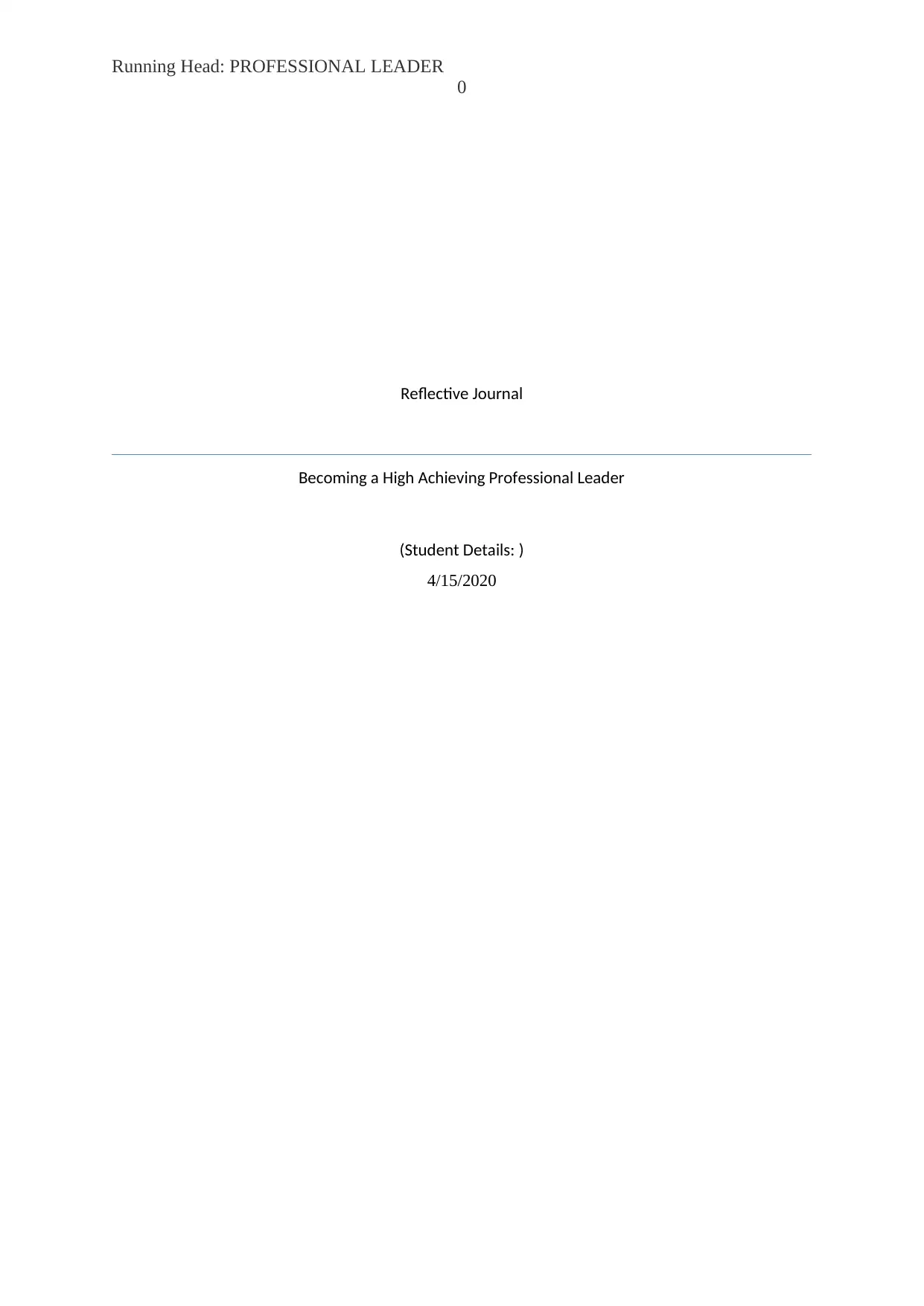
Running Head: PROFESSIONAL LEADER
0
Reflective Journal
Becoming a High Achieving Professional Leader
(Student Details: )
4/15/2020
0
Reflective Journal
Becoming a High Achieving Professional Leader
(Student Details: )
4/15/2020
Paraphrase This Document
Need a fresh take? Get an instant paraphrase of this document with our AI Paraphraser
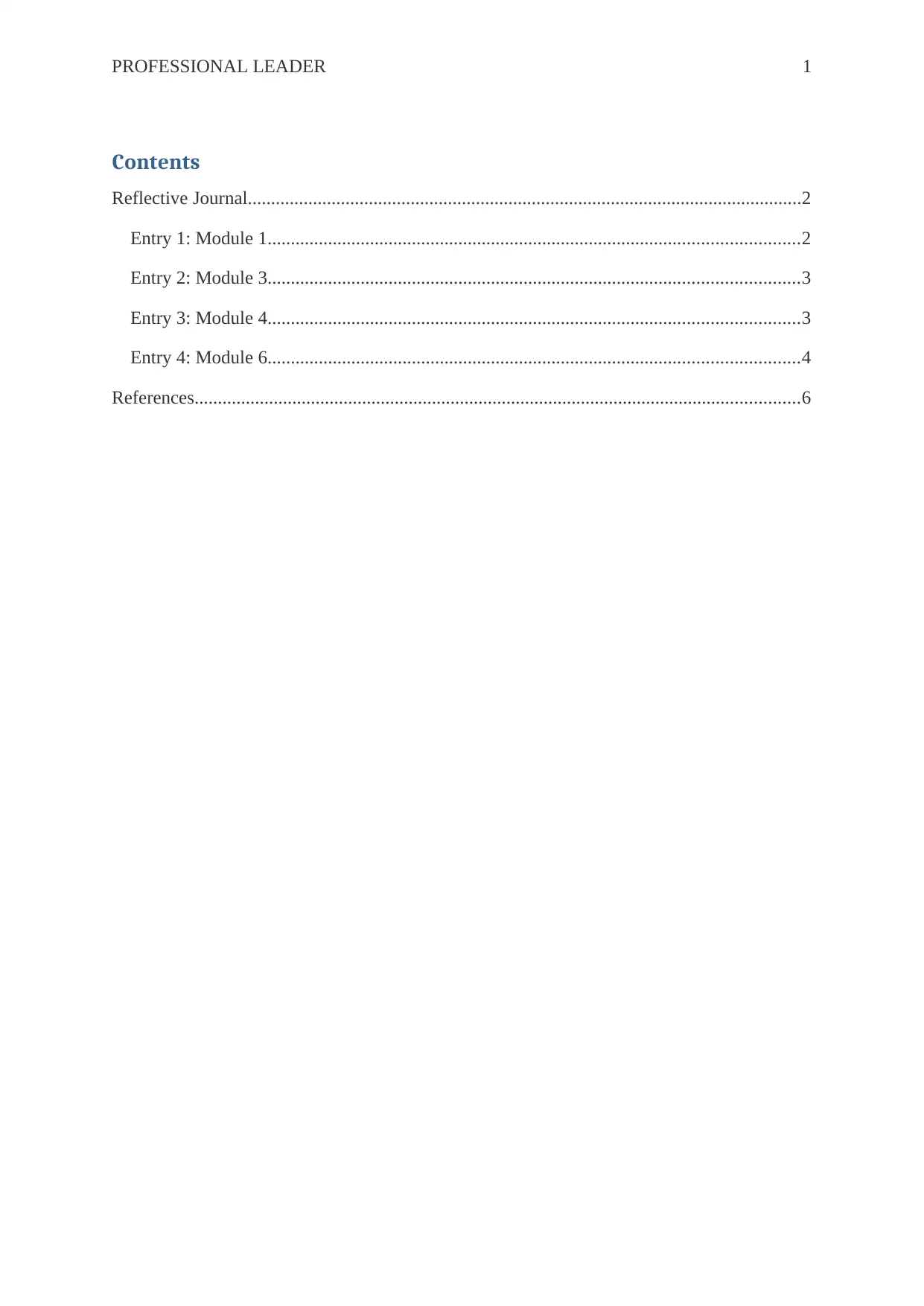
PROFESSIONAL LEADER 1
Contents
Reflective Journal.......................................................................................................................2
Entry 1: Module 1..................................................................................................................2
Entry 2: Module 3..................................................................................................................3
Entry 3: Module 4..................................................................................................................3
Entry 4: Module 6..................................................................................................................4
References..................................................................................................................................6
Contents
Reflective Journal.......................................................................................................................2
Entry 1: Module 1..................................................................................................................2
Entry 2: Module 3..................................................................................................................3
Entry 3: Module 4..................................................................................................................3
Entry 4: Module 6..................................................................................................................4
References..................................................................................................................................6
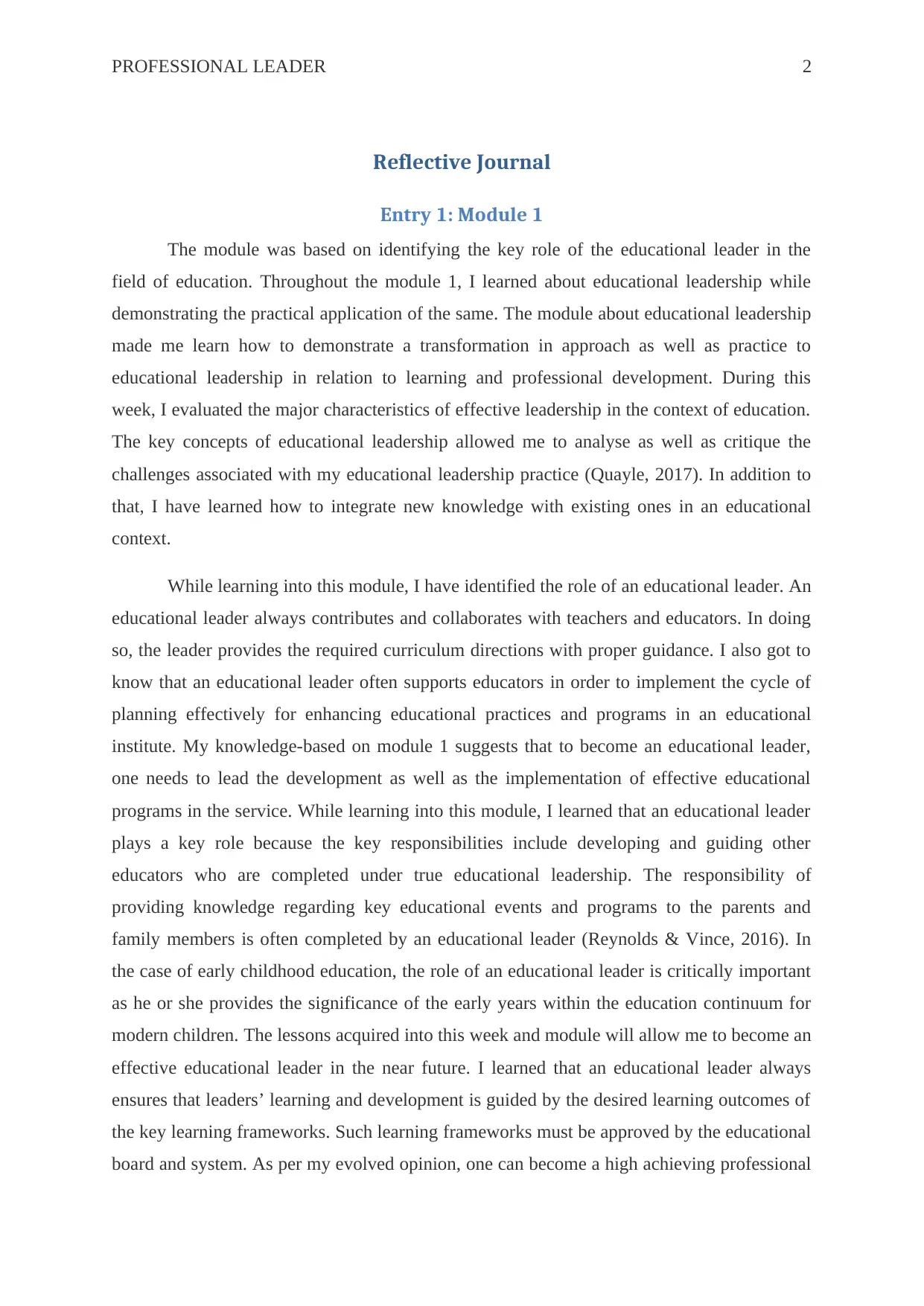
PROFESSIONAL LEADER 2
Reflective Journal
Entry 1: Module 1
The module was based on identifying the key role of the educational leader in the
field of education. Throughout the module 1, I learned about educational leadership while
demonstrating the practical application of the same. The module about educational leadership
made me learn how to demonstrate a transformation in approach as well as practice to
educational leadership in relation to learning and professional development. During this
week, I evaluated the major characteristics of effective leadership in the context of education.
The key concepts of educational leadership allowed me to analyse as well as critique the
challenges associated with my educational leadership practice (Quayle, 2017). In addition to
that, I have learned how to integrate new knowledge with existing ones in an educational
context.
While learning into this module, I have identified the role of an educational leader. An
educational leader always contributes and collaborates with teachers and educators. In doing
so, the leader provides the required curriculum directions with proper guidance. I also got to
know that an educational leader often supports educators in order to implement the cycle of
planning effectively for enhancing educational practices and programs in an educational
institute. My knowledge-based on module 1 suggests that to become an educational leader,
one needs to lead the development as well as the implementation of effective educational
programs in the service. While learning into this module, I learned that an educational leader
plays a key role because the key responsibilities include developing and guiding other
educators who are completed under true educational leadership. The responsibility of
providing knowledge regarding key educational events and programs to the parents and
family members is often completed by an educational leader (Reynolds & Vince, 2016). In
the case of early childhood education, the role of an educational leader is critically important
as he or she provides the significance of the early years within the education continuum for
modern children. The lessons acquired into this week and module will allow me to become an
effective educational leader in the near future. I learned that an educational leader always
ensures that leaders’ learning and development is guided by the desired learning outcomes of
the key learning frameworks. Such learning frameworks must be approved by the educational
board and system. As per my evolved opinion, one can become a high achieving professional
Reflective Journal
Entry 1: Module 1
The module was based on identifying the key role of the educational leader in the
field of education. Throughout the module 1, I learned about educational leadership while
demonstrating the practical application of the same. The module about educational leadership
made me learn how to demonstrate a transformation in approach as well as practice to
educational leadership in relation to learning and professional development. During this
week, I evaluated the major characteristics of effective leadership in the context of education.
The key concepts of educational leadership allowed me to analyse as well as critique the
challenges associated with my educational leadership practice (Quayle, 2017). In addition to
that, I have learned how to integrate new knowledge with existing ones in an educational
context.
While learning into this module, I have identified the role of an educational leader. An
educational leader always contributes and collaborates with teachers and educators. In doing
so, the leader provides the required curriculum directions with proper guidance. I also got to
know that an educational leader often supports educators in order to implement the cycle of
planning effectively for enhancing educational practices and programs in an educational
institute. My knowledge-based on module 1 suggests that to become an educational leader,
one needs to lead the development as well as the implementation of effective educational
programs in the service. While learning into this module, I learned that an educational leader
plays a key role because the key responsibilities include developing and guiding other
educators who are completed under true educational leadership. The responsibility of
providing knowledge regarding key educational events and programs to the parents and
family members is often completed by an educational leader (Reynolds & Vince, 2016). In
the case of early childhood education, the role of an educational leader is critically important
as he or she provides the significance of the early years within the education continuum for
modern children. The lessons acquired into this week and module will allow me to become an
effective educational leader in the near future. I learned that an educational leader always
ensures that leaders’ learning and development is guided by the desired learning outcomes of
the key learning frameworks. Such learning frameworks must be approved by the educational
board and system. As per my evolved opinion, one can become a high achieving professional
⊘ This is a preview!⊘
Do you want full access?
Subscribe today to unlock all pages.

Trusted by 1+ million students worldwide
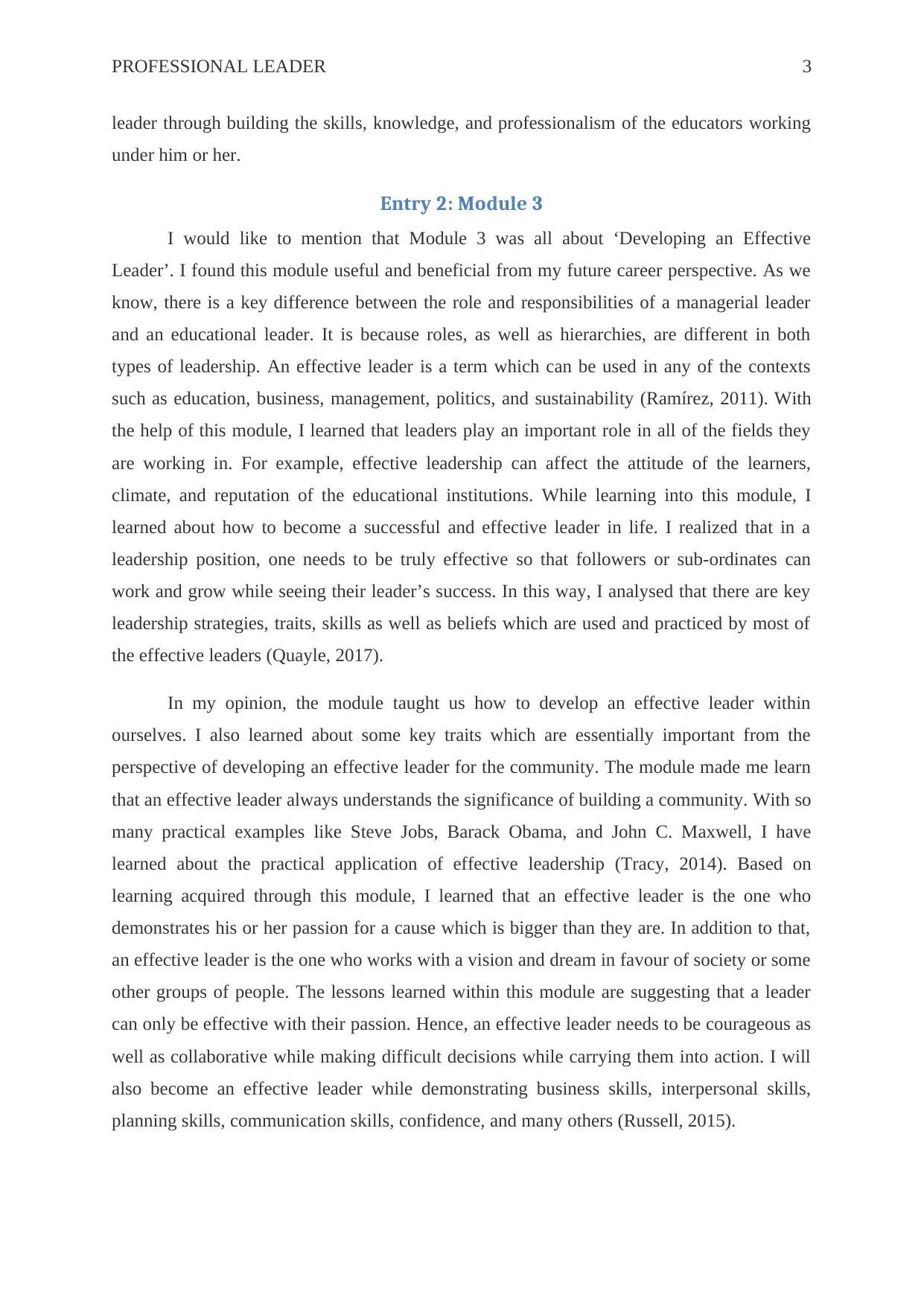
PROFESSIONAL LEADER 3
leader through building the skills, knowledge, and professionalism of the educators working
under him or her.
Entry 2: Module 3
I would like to mention that Module 3 was all about ‘Developing an Effective
Leader’. I found this module useful and beneficial from my future career perspective. As we
know, there is a key difference between the role and responsibilities of a managerial leader
and an educational leader. It is because roles, as well as hierarchies, are different in both
types of leadership. An effective leader is a term which can be used in any of the contexts
such as education, business, management, politics, and sustainability (Ramírez, 2011). With
the help of this module, I learned that leaders play an important role in all of the fields they
are working in. For example, effective leadership can affect the attitude of the learners,
climate, and reputation of the educational institutions. While learning into this module, I
learned about how to become a successful and effective leader in life. I realized that in a
leadership position, one needs to be truly effective so that followers or sub-ordinates can
work and grow while seeing their leader’s success. In this way, I analysed that there are key
leadership strategies, traits, skills as well as beliefs which are used and practiced by most of
the effective leaders (Quayle, 2017).
In my opinion, the module taught us how to develop an effective leader within
ourselves. I also learned about some key traits which are essentially important from the
perspective of developing an effective leader for the community. The module made me learn
that an effective leader always understands the significance of building a community. With so
many practical examples like Steve Jobs, Barack Obama, and John C. Maxwell, I have
learned about the practical application of effective leadership (Tracy, 2014). Based on
learning acquired through this module, I learned that an effective leader is the one who
demonstrates his or her passion for a cause which is bigger than they are. In addition to that,
an effective leader is the one who works with a vision and dream in favour of society or some
other groups of people. The lessons learned within this module are suggesting that a leader
can only be effective with their passion. Hence, an effective leader needs to be courageous as
well as collaborative while making difficult decisions while carrying them into action. I will
also become an effective leader while demonstrating business skills, interpersonal skills,
planning skills, communication skills, confidence, and many others (Russell, 2015).
leader through building the skills, knowledge, and professionalism of the educators working
under him or her.
Entry 2: Module 3
I would like to mention that Module 3 was all about ‘Developing an Effective
Leader’. I found this module useful and beneficial from my future career perspective. As we
know, there is a key difference between the role and responsibilities of a managerial leader
and an educational leader. It is because roles, as well as hierarchies, are different in both
types of leadership. An effective leader is a term which can be used in any of the contexts
such as education, business, management, politics, and sustainability (Ramírez, 2011). With
the help of this module, I learned that leaders play an important role in all of the fields they
are working in. For example, effective leadership can affect the attitude of the learners,
climate, and reputation of the educational institutions. While learning into this module, I
learned about how to become a successful and effective leader in life. I realized that in a
leadership position, one needs to be truly effective so that followers or sub-ordinates can
work and grow while seeing their leader’s success. In this way, I analysed that there are key
leadership strategies, traits, skills as well as beliefs which are used and practiced by most of
the effective leaders (Quayle, 2017).
In my opinion, the module taught us how to develop an effective leader within
ourselves. I also learned about some key traits which are essentially important from the
perspective of developing an effective leader for the community. The module made me learn
that an effective leader always understands the significance of building a community. With so
many practical examples like Steve Jobs, Barack Obama, and John C. Maxwell, I have
learned about the practical application of effective leadership (Tracy, 2014). Based on
learning acquired through this module, I learned that an effective leader is the one who
demonstrates his or her passion for a cause which is bigger than they are. In addition to that,
an effective leader is the one who works with a vision and dream in favour of society or some
other groups of people. The lessons learned within this module are suggesting that a leader
can only be effective with their passion. Hence, an effective leader needs to be courageous as
well as collaborative while making difficult decisions while carrying them into action. I will
also become an effective leader while demonstrating business skills, interpersonal skills,
planning skills, communication skills, confidence, and many others (Russell, 2015).
Paraphrase This Document
Need a fresh take? Get an instant paraphrase of this document with our AI Paraphraser
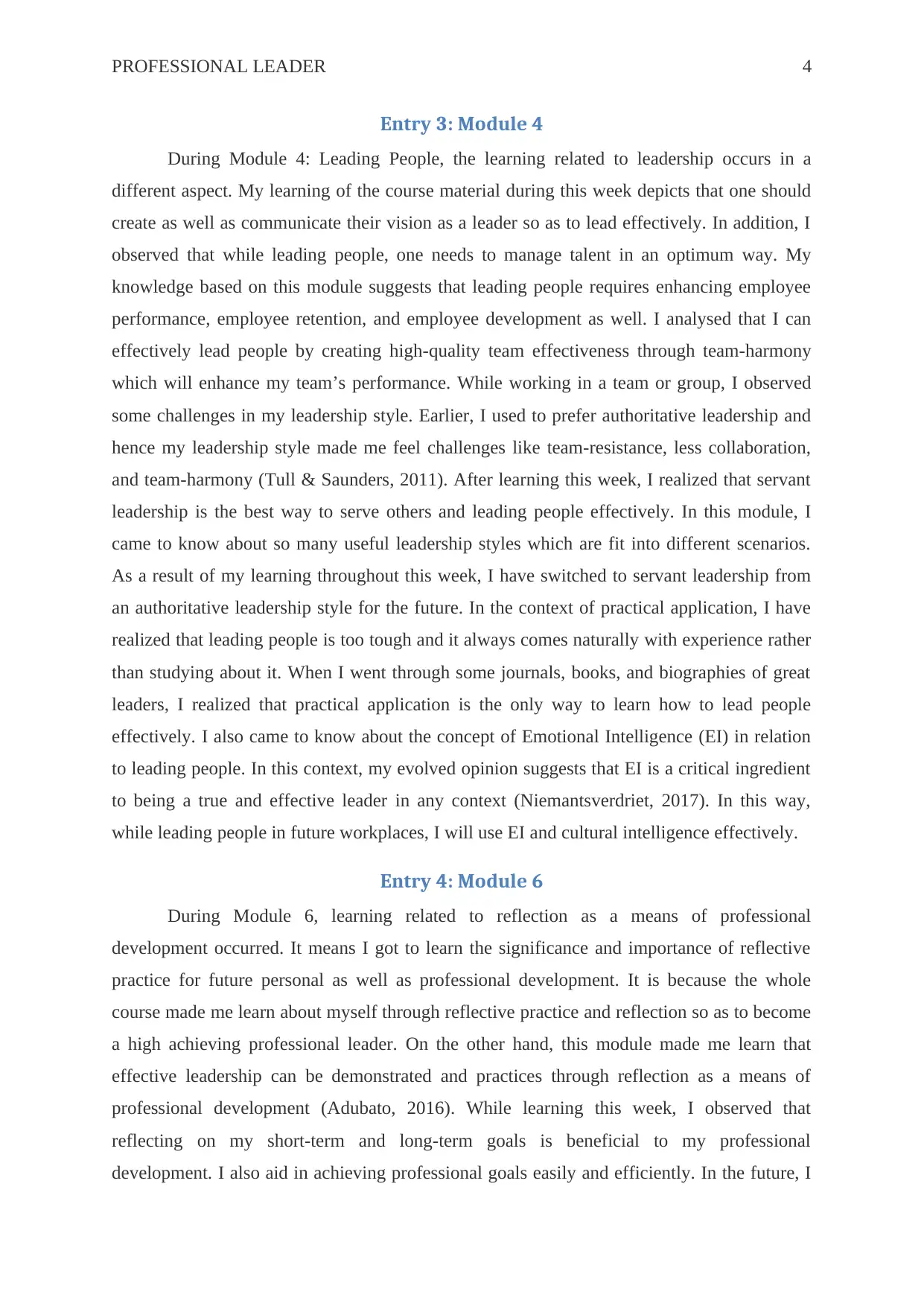
PROFESSIONAL LEADER 4
Entry 3: Module 4
During Module 4: Leading People, the learning related to leadership occurs in a
different aspect. My learning of the course material during this week depicts that one should
create as well as communicate their vision as a leader so as to lead effectively. In addition, I
observed that while leading people, one needs to manage talent in an optimum way. My
knowledge based on this module suggests that leading people requires enhancing employee
performance, employee retention, and employee development as well. I analysed that I can
effectively lead people by creating high-quality team effectiveness through team-harmony
which will enhance my team’s performance. While working in a team or group, I observed
some challenges in my leadership style. Earlier, I used to prefer authoritative leadership and
hence my leadership style made me feel challenges like team-resistance, less collaboration,
and team-harmony (Tull & Saunders, 2011). After learning this week, I realized that servant
leadership is the best way to serve others and leading people effectively. In this module, I
came to know about so many useful leadership styles which are fit into different scenarios.
As a result of my learning throughout this week, I have switched to servant leadership from
an authoritative leadership style for the future. In the context of practical application, I have
realized that leading people is too tough and it always comes naturally with experience rather
than studying about it. When I went through some journals, books, and biographies of great
leaders, I realized that practical application is the only way to learn how to lead people
effectively. I also came to know about the concept of Emotional Intelligence (EI) in relation
to leading people. In this context, my evolved opinion suggests that EI is a critical ingredient
to being a true and effective leader in any context (Niemantsverdriet, 2017). In this way,
while leading people in future workplaces, I will use EI and cultural intelligence effectively.
Entry 4: Module 6
During Module 6, learning related to reflection as a means of professional
development occurred. It means I got to learn the significance and importance of reflective
practice for future personal as well as professional development. It is because the whole
course made me learn about myself through reflective practice and reflection so as to become
a high achieving professional leader. On the other hand, this module made me learn that
effective leadership can be demonstrated and practices through reflection as a means of
professional development (Adubato, 2016). While learning this week, I observed that
reflecting on my short-term and long-term goals is beneficial to my professional
development. I also aid in achieving professional goals easily and efficiently. In the future, I
Entry 3: Module 4
During Module 4: Leading People, the learning related to leadership occurs in a
different aspect. My learning of the course material during this week depicts that one should
create as well as communicate their vision as a leader so as to lead effectively. In addition, I
observed that while leading people, one needs to manage talent in an optimum way. My
knowledge based on this module suggests that leading people requires enhancing employee
performance, employee retention, and employee development as well. I analysed that I can
effectively lead people by creating high-quality team effectiveness through team-harmony
which will enhance my team’s performance. While working in a team or group, I observed
some challenges in my leadership style. Earlier, I used to prefer authoritative leadership and
hence my leadership style made me feel challenges like team-resistance, less collaboration,
and team-harmony (Tull & Saunders, 2011). After learning this week, I realized that servant
leadership is the best way to serve others and leading people effectively. In this module, I
came to know about so many useful leadership styles which are fit into different scenarios.
As a result of my learning throughout this week, I have switched to servant leadership from
an authoritative leadership style for the future. In the context of practical application, I have
realized that leading people is too tough and it always comes naturally with experience rather
than studying about it. When I went through some journals, books, and biographies of great
leaders, I realized that practical application is the only way to learn how to lead people
effectively. I also came to know about the concept of Emotional Intelligence (EI) in relation
to leading people. In this context, my evolved opinion suggests that EI is a critical ingredient
to being a true and effective leader in any context (Niemantsverdriet, 2017). In this way,
while leading people in future workplaces, I will use EI and cultural intelligence effectively.
Entry 4: Module 6
During Module 6, learning related to reflection as a means of professional
development occurred. It means I got to learn the significance and importance of reflective
practice for future personal as well as professional development. It is because the whole
course made me learn about myself through reflective practice and reflection so as to become
a high achieving professional leader. On the other hand, this module made me learn that
effective leadership can be demonstrated and practices through reflection as a means of
professional development (Adubato, 2016). While learning this week, I observed that
reflecting on my short-term and long-term goals is beneficial to my professional
development. I also aid in achieving professional goals easily and efficiently. In the future, I
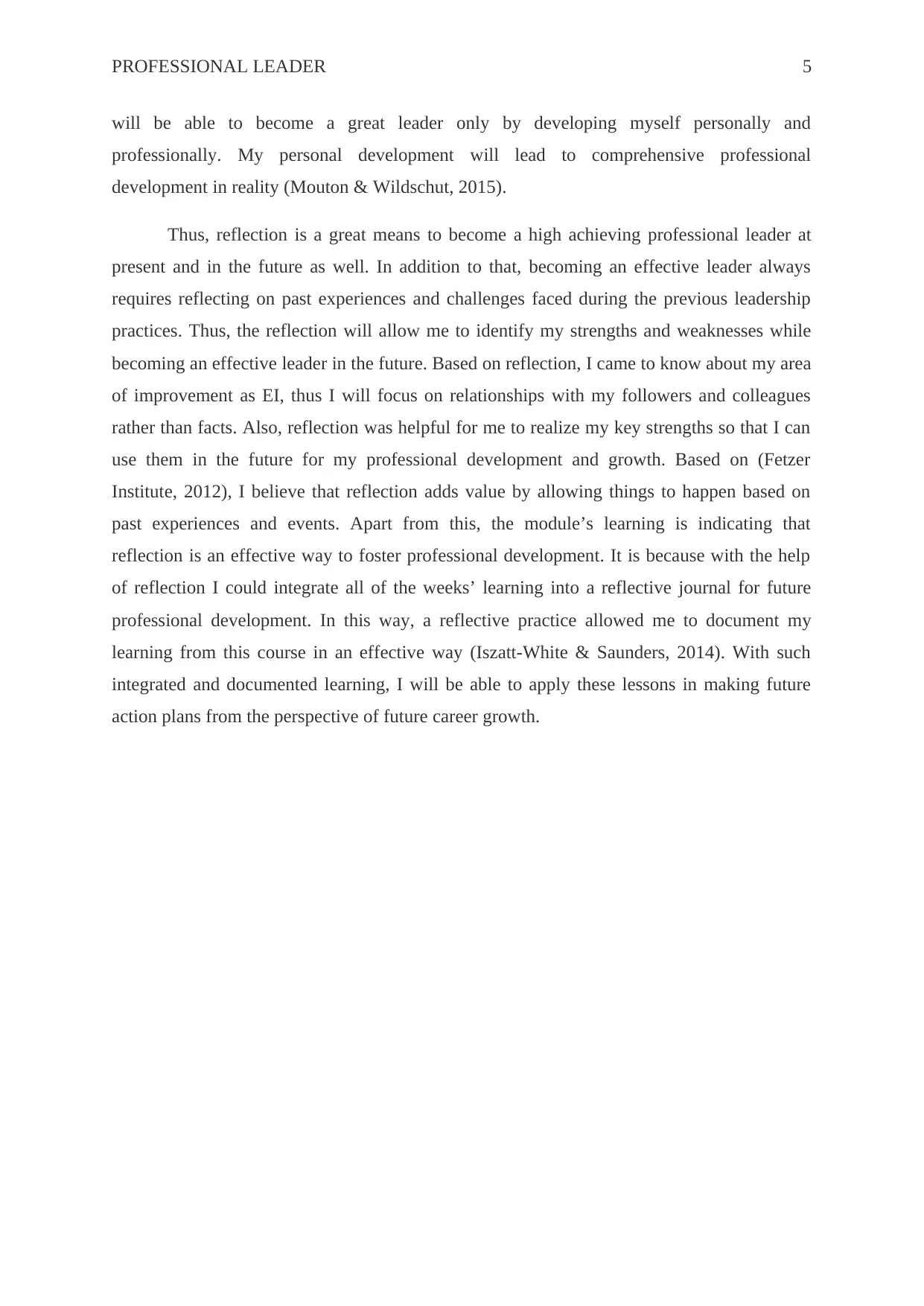
PROFESSIONAL LEADER 5
will be able to become a great leader only by developing myself personally and
professionally. My personal development will lead to comprehensive professional
development in reality (Mouton & Wildschut, 2015).
Thus, reflection is a great means to become a high achieving professional leader at
present and in the future as well. In addition to that, becoming an effective leader always
requires reflecting on past experiences and challenges faced during the previous leadership
practices. Thus, the reflection will allow me to identify my strengths and weaknesses while
becoming an effective leader in the future. Based on reflection, I came to know about my area
of improvement as EI, thus I will focus on relationships with my followers and colleagues
rather than facts. Also, reflection was helpful for me to realize my key strengths so that I can
use them in the future for my professional development and growth. Based on (Fetzer
Institute, 2012), I believe that reflection adds value by allowing things to happen based on
past experiences and events. Apart from this, the module’s learning is indicating that
reflection is an effective way to foster professional development. It is because with the help
of reflection I could integrate all of the weeks’ learning into a reflective journal for future
professional development. In this way, a reflective practice allowed me to document my
learning from this course in an effective way (Iszatt-White & Saunders, 2014). With such
integrated and documented learning, I will be able to apply these lessons in making future
action plans from the perspective of future career growth.
will be able to become a great leader only by developing myself personally and
professionally. My personal development will lead to comprehensive professional
development in reality (Mouton & Wildschut, 2015).
Thus, reflection is a great means to become a high achieving professional leader at
present and in the future as well. In addition to that, becoming an effective leader always
requires reflecting on past experiences and challenges faced during the previous leadership
practices. Thus, the reflection will allow me to identify my strengths and weaknesses while
becoming an effective leader in the future. Based on reflection, I came to know about my area
of improvement as EI, thus I will focus on relationships with my followers and colleagues
rather than facts. Also, reflection was helpful for me to realize my key strengths so that I can
use them in the future for my professional development and growth. Based on (Fetzer
Institute, 2012), I believe that reflection adds value by allowing things to happen based on
past experiences and events. Apart from this, the module’s learning is indicating that
reflection is an effective way to foster professional development. It is because with the help
of reflection I could integrate all of the weeks’ learning into a reflective journal for future
professional development. In this way, a reflective practice allowed me to document my
learning from this course in an effective way (Iszatt-White & Saunders, 2014). With such
integrated and documented learning, I will be able to apply these lessons in making future
action plans from the perspective of future career growth.
⊘ This is a preview!⊘
Do you want full access?
Subscribe today to unlock all pages.

Trusted by 1+ million students worldwide
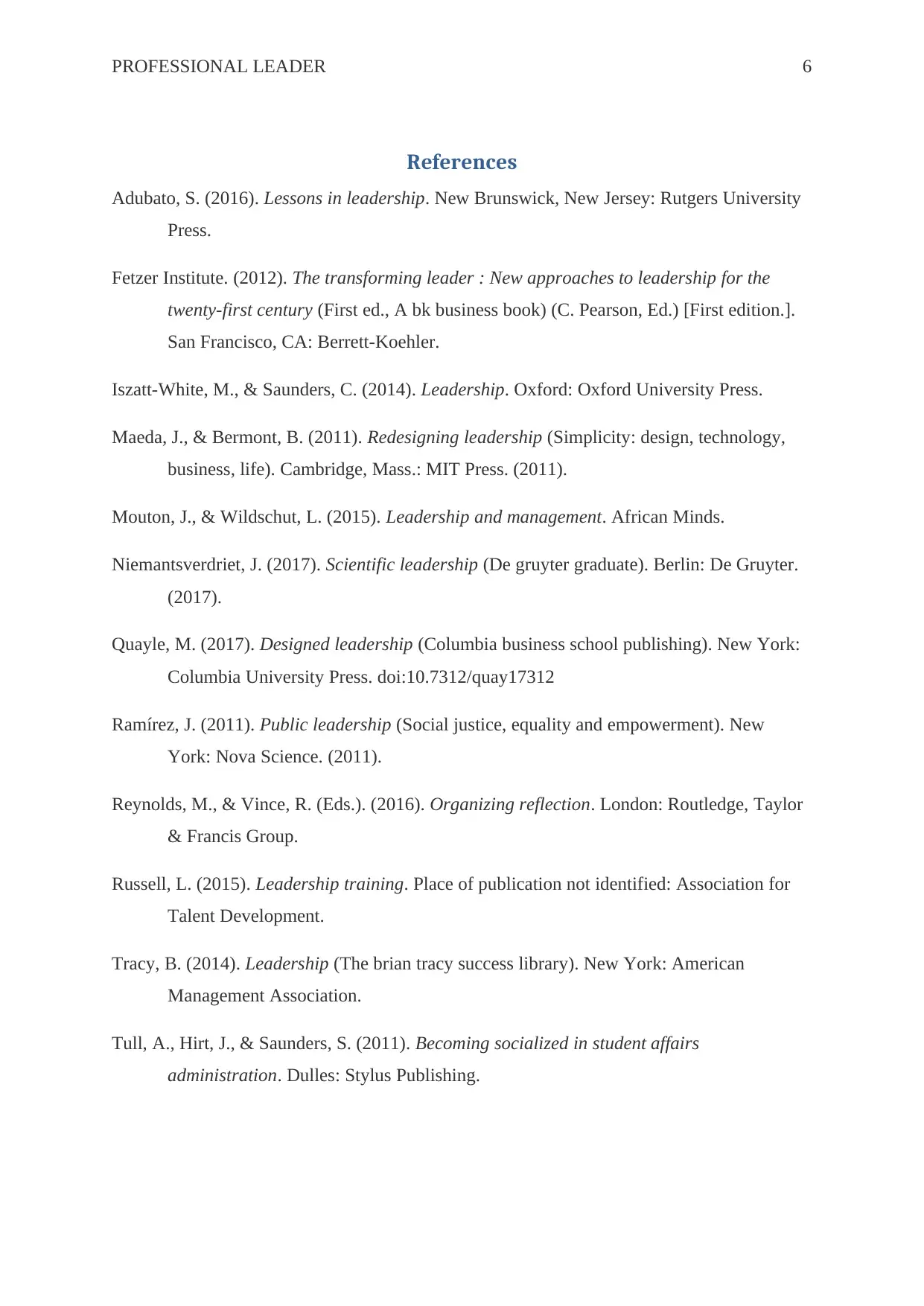
PROFESSIONAL LEADER 6
References
Adubato, S. (2016). Lessons in leadership. New Brunswick, New Jersey: Rutgers University
Press.
Fetzer Institute. (2012). The transforming leader : New approaches to leadership for the
twenty-first century (First ed., A bk business book) (C. Pearson, Ed.) [First edition.].
San Francisco, CA: Berrett-Koehler.
Iszatt-White, M., & Saunders, C. (2014). Leadership. Oxford: Oxford University Press.
Maeda, J., & Bermont, B. (2011). Redesigning leadership (Simplicity: design, technology,
business, life). Cambridge, Mass.: MIT Press. (2011).
Mouton, J., & Wildschut, L. (2015). Leadership and management. African Minds.
Niemantsverdriet, J. (2017). Scientific leadership (De gruyter graduate). Berlin: De Gruyter.
(2017).
Quayle, M. (2017). Designed leadership (Columbia business school publishing). New York:
Columbia University Press. doi:10.7312/quay17312
Ramírez, J. (2011). Public leadership (Social justice, equality and empowerment). New
York: Nova Science. (2011).
Reynolds, M., & Vince, R. (Eds.). (2016). Organizing reflection. London: Routledge, Taylor
& Francis Group.
Russell, L. (2015). Leadership training. Place of publication not identified: Association for
Talent Development.
Tracy, B. (2014). Leadership (The brian tracy success library). New York: American
Management Association.
Tull, A., Hirt, J., & Saunders, S. (2011). Becoming socialized in student affairs
administration. Dulles: Stylus Publishing.
References
Adubato, S. (2016). Lessons in leadership. New Brunswick, New Jersey: Rutgers University
Press.
Fetzer Institute. (2012). The transforming leader : New approaches to leadership for the
twenty-first century (First ed., A bk business book) (C. Pearson, Ed.) [First edition.].
San Francisco, CA: Berrett-Koehler.
Iszatt-White, M., & Saunders, C. (2014). Leadership. Oxford: Oxford University Press.
Maeda, J., & Bermont, B. (2011). Redesigning leadership (Simplicity: design, technology,
business, life). Cambridge, Mass.: MIT Press. (2011).
Mouton, J., & Wildschut, L. (2015). Leadership and management. African Minds.
Niemantsverdriet, J. (2017). Scientific leadership (De gruyter graduate). Berlin: De Gruyter.
(2017).
Quayle, M. (2017). Designed leadership (Columbia business school publishing). New York:
Columbia University Press. doi:10.7312/quay17312
Ramírez, J. (2011). Public leadership (Social justice, equality and empowerment). New
York: Nova Science. (2011).
Reynolds, M., & Vince, R. (Eds.). (2016). Organizing reflection. London: Routledge, Taylor
& Francis Group.
Russell, L. (2015). Leadership training. Place of publication not identified: Association for
Talent Development.
Tracy, B. (2014). Leadership (The brian tracy success library). New York: American
Management Association.
Tull, A., Hirt, J., & Saunders, S. (2011). Becoming socialized in student affairs
administration. Dulles: Stylus Publishing.
Paraphrase This Document
Need a fresh take? Get an instant paraphrase of this document with our AI Paraphraser
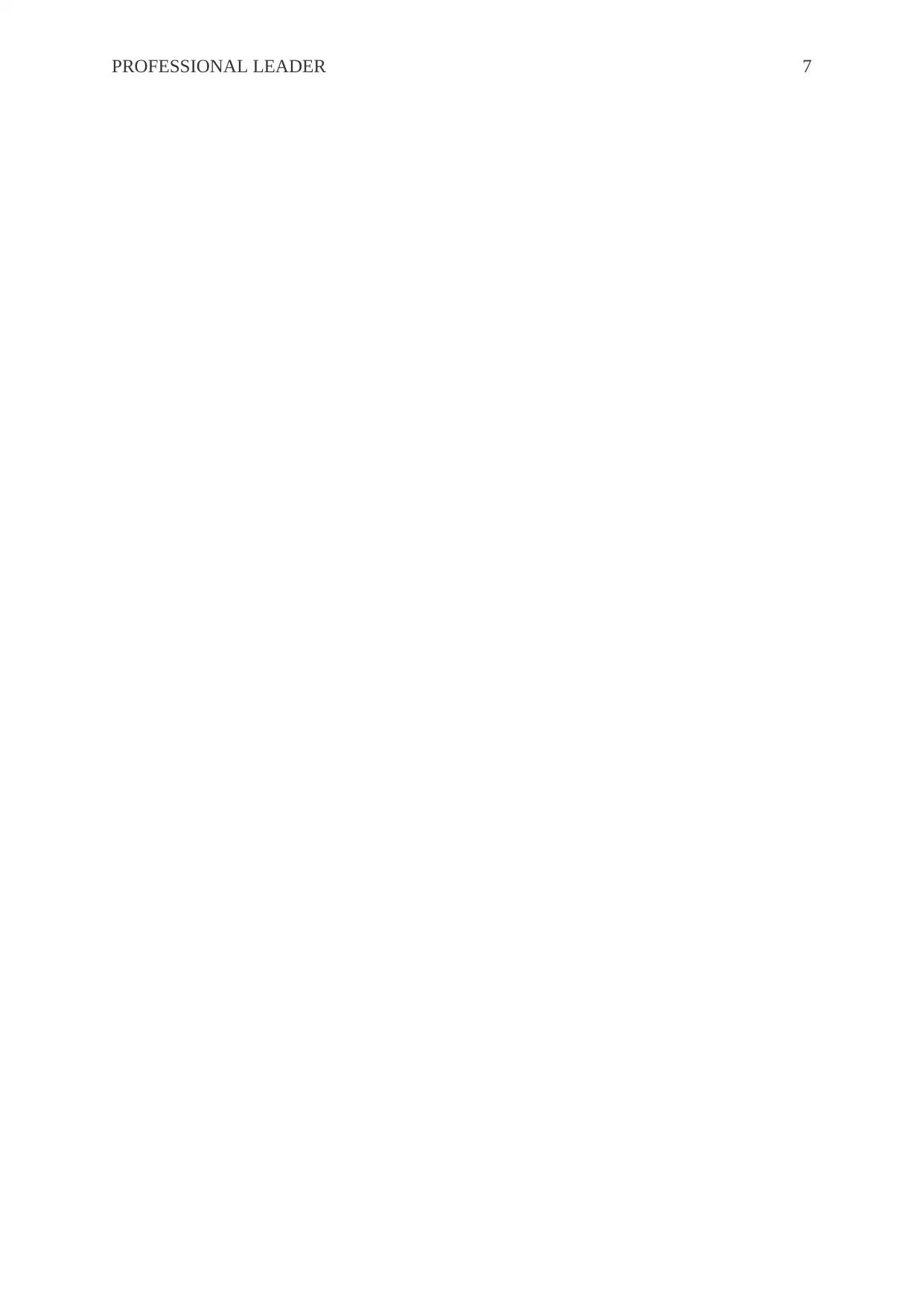
PROFESSIONAL LEADER 7
1 out of 8
Related Documents
Your All-in-One AI-Powered Toolkit for Academic Success.
+13062052269
info@desklib.com
Available 24*7 on WhatsApp / Email
![[object Object]](/_next/static/media/star-bottom.7253800d.svg)
Unlock your academic potential
Copyright © 2020–2026 A2Z Services. All Rights Reserved. Developed and managed by ZUCOL.




